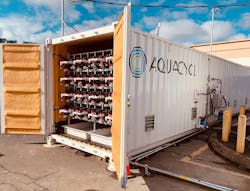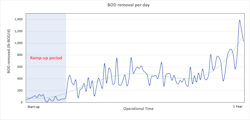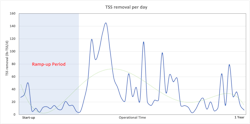Case study: How PepsiCo reduced costs and addressed climate and water goals through onsite wastewater treatment
PepsiCo has embarked on a 2030 business transformation that puts the environment and human capital at the center of the business choices that are made. The company call this pep+ (PepsiCo Positive), and it embodies the company’s targets to become net water positive and achieve net-zero emissions. As a leading CPG company, PepsiCo is committed to becoming net water positive by 2030 and achieving net-zero emissions across the entire value chain (Scope 1, 2 & 3) by 2040.
As part of this journey, PepsiCo conducted a pilot to look for cost-effective and sustainable alternatives to improve existing wastewater management at the company’s bottling facility in Fresno, California. PepsiCo needed a technology that could address operational challenges while simultaneously bringing water efficiency and climate benefits. PepsiCo was interested in Aquacycl’s BioElectrochemical Treatment Technology (BETT), a modular, onsite wastewater treatment as a service which guarantees permit compliance while mitigating up to 90% of greenhouse gas (GHG) emissions.
Challenged by low-volume, high concentration wastewater
The primary operation at the Fresno facility is manufacture of carbonated and non-carbonated beverages in bottles and cans, but PepsiCo also has crushing operations to handle plant waste and market returns of out-of-date products. The incoming crusher wastewater includes a diverse and variable array of different beverage products including sodas, energy drinks, teas and ready-to-drink coffee.
Aquacycl’s BETT system
The BETT system is the only technology for treatment of such highly concentrated organic wastewaters without dilution. The system operates with very low power consumption, and generates direct electricity, mitigating greenhouse gases that would otherwise be generated by use of conventional approaches.
The BETT systems use natural bacteria to clean the wastewater, reduce sludge and produce direct electricity (no methane). Locally sourced bacteria break down organic matter in the wastewater and release electrons during their natural process of respiration. The released electrons are captured as direct current and can be used to offset the power consumption of the system. Higher electrical currents enable faster treatment rates due to enhanced microbial respiration, resulting in treatment rates in hours instead of the days or weeks required by other anaerobic processes. The generated electrical current also enables remote, real-time monitoring of system performance and offsite troubleshooting capabilities. The system is provided as a service, which includes all monitoring, maintenance and sludge management, providing hands-off operations for the customer.
Validating the technology
Aquacycl and PepsiCo installed a demonstration project to validate the business case for using BETT to treat wastewater. The system was equipped to treat half the volume during the demonstration stage and was validated over a seven-month period showing reliability and cost savings across a variable range of operational conditions. The first month onsite was used to start up the system, and the system was operated under continuous flow for six months thereafter.
During the demonstration period, PepsiCo and Aquacycl agreed on the following KPIs: removal of 800 pounds (lbs) Biological Oxygen Demand (BOD) per day when incoming BOD was greater than 60,000 mg/L or 85% BOD removal when BOD was lower than 60,000 mg/L. By achieving these levels, Aquacycl’s BETT system could prove cost-effective and justify expansion to treat the full volume.
During the continuous flow operation, the system demonstrated removal rates that exceeded KPIs, with BOD removal of more than 1,350 lbs/day and Total Suspended Solids (TSS) removal of up to 140 lbs/day. The system performed well under variable organic loads and wastewater compositions, with inflow BOD as high as 149,500 mg/L, which was more than twice the expected concentration.
Addressing operational and sustainability benefits
PepsiCo was able to recognize both sustainability and operational benefits of the system. By improving the quality of discharge, the company continued to demonstrate its leadership in corporate water stewardship and progress towards its water and climate-related commitments. By treating onsite and relieving the receiving utility of the burden of treatment, the BETT system mitigated 100 tons of greenhouse gas emissions per month.
This helped to maintain a positive relationship with the utility, as the BETT system acts as industrial pretreatment and avoids significant BOD discharge to the sewer. The utility benefitted from BETT by avoiding the energy consumption and greenhouse gas emissions that would otherwise be associated with treatment of the company’s BOD load.
In addition to the climate benefits, working with Aquacycl provided predictability of wastewater treatment costs, reducing surcharge variability and demonstrating a 30% reduction in costs, guaranteed performance, hands-off operations and 24/7 remote monitoring and control which provided peace of mind, without requiring additional personnel on staff to manage the system.
Moving to full scale
After the successful onsite demonstration, PepsiCo expanded the agreement to a multi-year, pay-for-performance contract and doubled treatment capacity to full scale. Aquacycl expanded the treatment capacity simply by installing additional reactors to complete the container capacity and treat the whole volume of crusher wastewater discharged by the plant in the same footprint.
During the first three months of operation at full capacity, the system has demonstrated the following results:
- 346 tons of carbon dioxide equivalents (CO2e) mitigated, or an average of 115 tons mitigated per month
- 124,000 kWh saved by the city for treatment, or an average of 41,350 kWh saved per month
Summary
As PepsiCo continues to operate with sustainability at its core, new technology plays a critical role in closing the gap. While wastewater is not typically considered in most companies’ Environmental, Social and Governance (ESG) strategies, this case study examines how it can directly address operational challenges and play an important role in addressing water scarcity, water quality, carbon mitigation and building resilience to climate change.
Rajendra Gursahaney is vice president, engineering, at PepsiCo.



